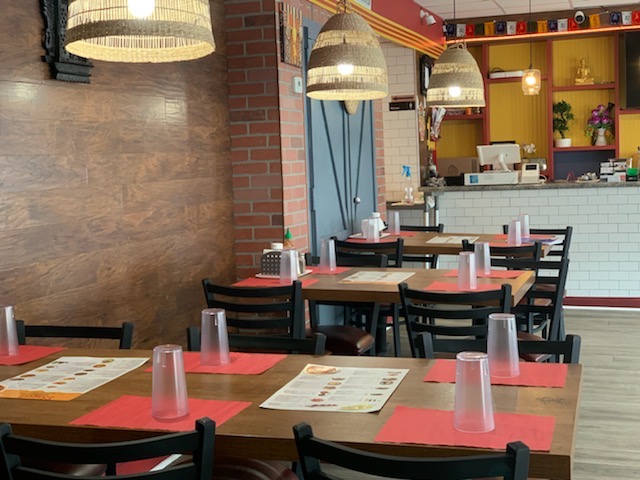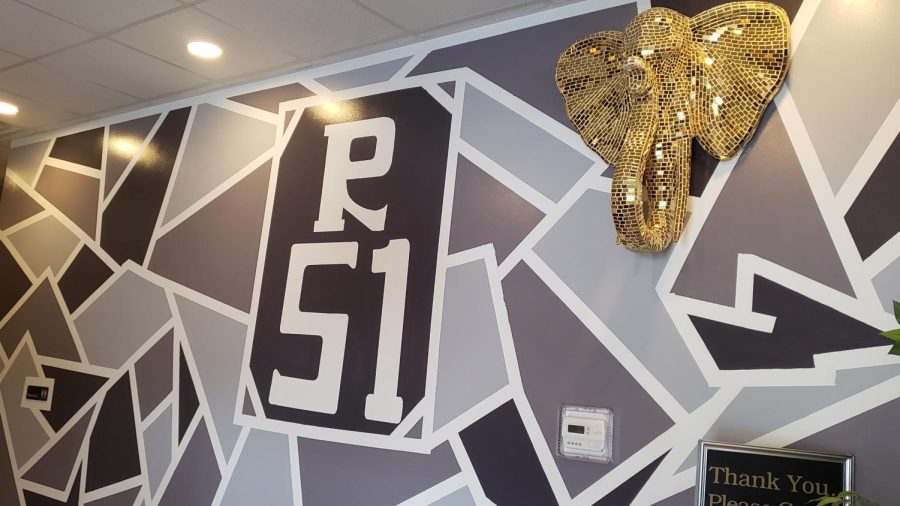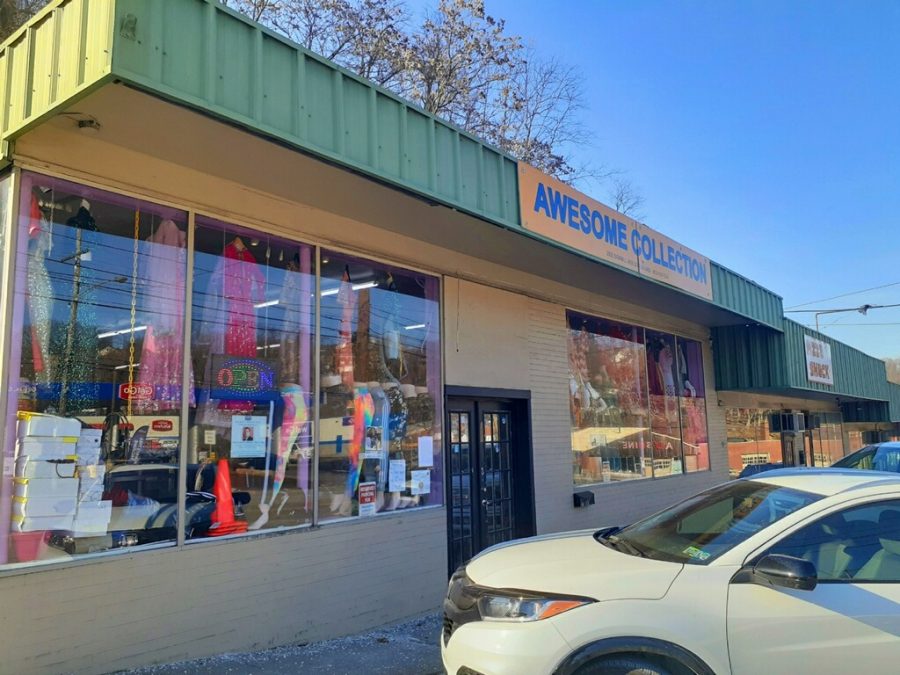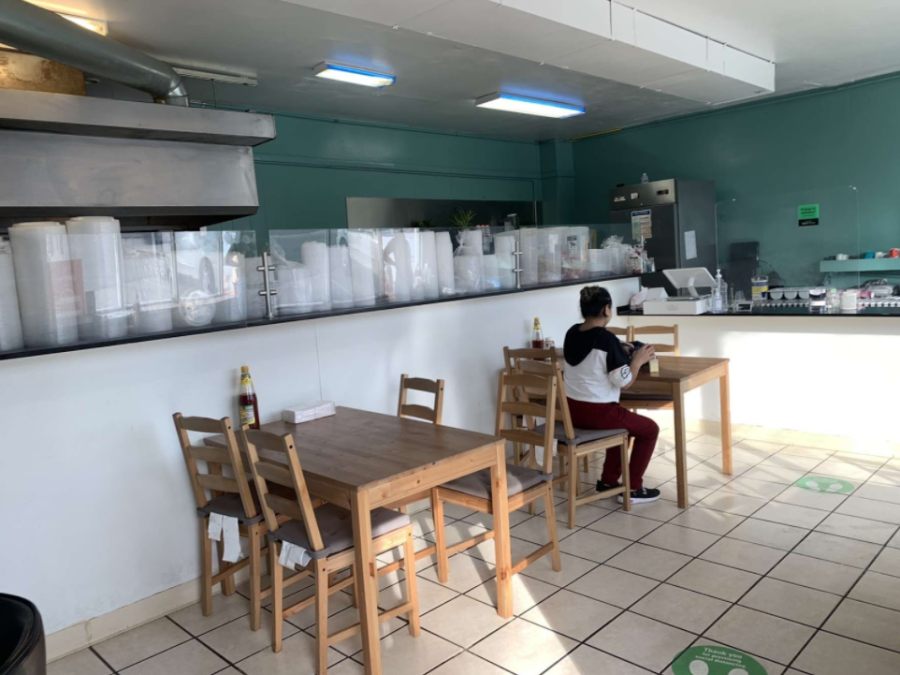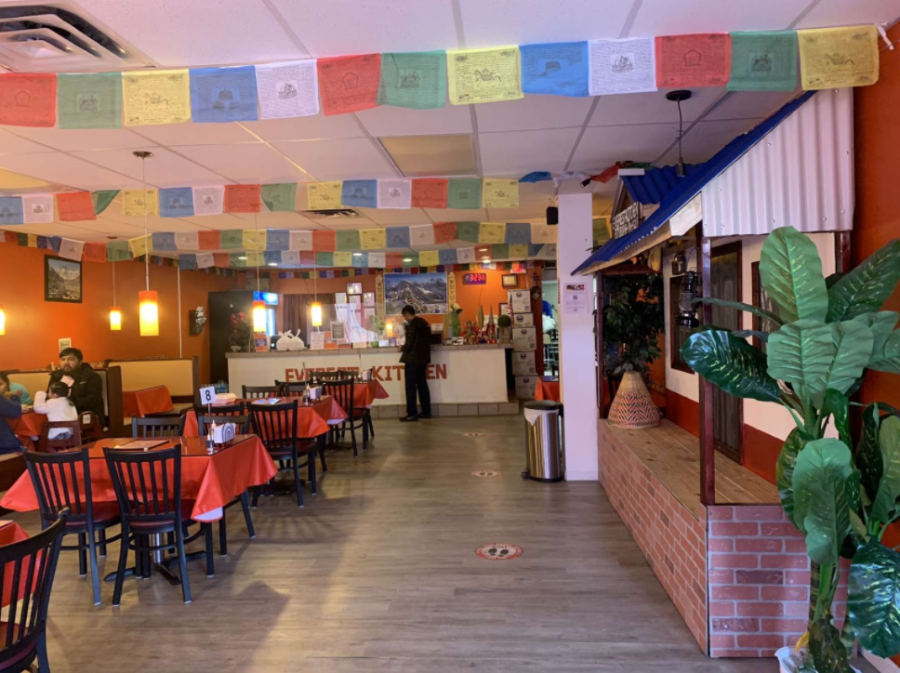A growing number of Nepali restaurants and other businesses have opened along Route 51, following the American tradition of newcomer ethnic groups serving their communities and other area residents.
Businesses share Nepali culture through Baldwin-Whitehall
March 4, 2022
Pittsburgh is home to one of the largest Bhutanese-Nepali refugee communities in the United States. Many of them reside in Baldwin-Whitehall and have recently started opening businesses, providing a chance for community members of all backgrounds to experience the richness of Nepali culture.
That culture is a mix of many elements, from the Newari people of the Kathmandu Valley to the Sherpas from the Himalayas, and the businesses that have sprung up along Route 51 reflect that diversity.
Some of the Nepali businesses in the area have been running for a few years, while some have just opened recently, during Covid times, and are trying to establish themselves. Here are the stories of some of the Bhutanese-Nepali owned businesses in and around the Route 51 area.
Restaurant’s interior highlights Nepali culture
After settling down in America, the owners of Sagun Asia decided it was time to start something new and opened a restaurant to celebrate their heritage.
The vibes at this restaurant are welcoming, cozy and spiritual, with multiple aspects of Hinduism and Buddhism incorporated into the interior design. As soon as customers enter, they are welcomed with a statue of Ganesh, who symbolizes the end of obstacles. So diners can leave their worries at the door and go into a world of South Asian cuisine.
Once the patrons are seated, they can look around and find different aspects of Asian traditions, including Nepali musical instruments from the country’s different ethnic groups, and symbols such as flags and Buddha statues to exemplify the Buddhist side of Nepal.
Sagun opened Summer 2021, and has been serving customers with Nepali courtesy ever since. The food served at the restaurant can be spicy, so the chefs are open to making alterations.
“All of our food is made by hand in the restaurant itself,” head chef Bikash Chhetri said.
Sagun offers a variety of traditional Nepali and Indian cuisine, the most popular dishes being sekwa, which is roasted meat; momo, a Nepali version of dumplings; thalis, a plate containing rice, lentils, and a variety of curries and pickles; traditional fish dishes, and desserts.
“I eat here with my family often. My children really like their momo,” customer Hari Adhikari said.
The restaurant, which was featured in Pittsburgh Magazine, believes in treating its customers as family.
“We get satisfaction when customers enjoy their meals,” Chhetri said.
Restaurant makes refugees’ dreams come true
The owners of Route 51 Restaurant, Leela and Yogesh Nepal, came to America 12 years ago as Bhutanese refugees. They had dreams of opening a restaurant and now have a place where they can share their stories with others.
“When we first opened up, we were pleasantly surprised by the amount of people eager to try Asian food,” Yogesh Nepal said.
They are looking forward to growing their business, while adding more foods to their menu and incorporating concepts from more countries into their fusion dishes.
“We are passionate about the food we serve and are willing to make adjustments to cater to our customers’ needs,” Leela Nepal said.
The Nepals’ find their motivation meeting new people and sharing their history through food. Route 51 Restaurant opened in June 2021 and offers home deliveries through many food services.
Frequent customer Andrea London commended the restaurant’s dedication to satisfying all customers.
“The staff is very friendly and welcoming. The restaurant’s ambiance itself is very aesthetically pleasing,” London said.
Some of their popular foods are chicken tikka masala, which is chicken marinated and cooked in a spiced curry sauce; samosas, which are fried pastries with savory fillings; and naans and rotis, which are different types of flatbreads. They also offer other curries, pickles, and desserts.
“I have recommended this place to many of my friends, and enjoy my time here every time,” London said.
Store owner follows in his father’s footsteps
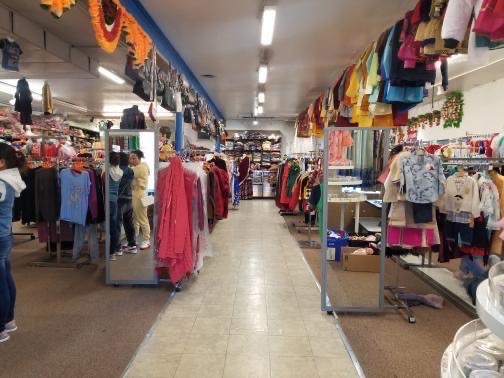
Racks of clothes at Nepali Clothing and Cosmetics, located at 4048 Saw Mill Run Blvd.
Ten years ago when Dev Gautam opened Nepali Clothing & Cosmetics, there were very few places where Nepali refugees could find traditional attire.
Seeing an opportunity and taking inspiration from his father’s business in Nepal, Gautam began serving the Pittsburgh area’s Nepali community in the spring of 2012.
“I worked with my father at his store in Nepal from a young age, and followed his footsteps to pursue a business career,” Gautam said.
Today there are many Nepali-owned businesses in and around the Pittsburgh area, but being one of the first was tough for Gautam and his family.
“At first we were very worried about how we were going to get our supplies, as we did not have any knowledge of the trading aspects of American businesses,” Gautam said.
Gautam said he got in touch with his friends back home and slowly worked out all of his problems. In doing so, he slowly learned how to grow and expand his business.
“When I left Nepal with my family, I had never even dreamed about being able to open my own store. America really has been the land of opportunities for me,” Gautam said.
Some of the traditional clothing items sold at Nepali Clothing & Cosmetics are the popular daura suruwal sets for men, which are three-piece sets consisting of a slip-knot shirt, pants, and a hat; and chaubandi choli, which is a slip-knot blouse for women, typically worn with a fariya, which is a skirt. They also provide items for pujas, which are religious ceremonies, such as agarbathis (incense sticks), diyas (small oil lamps), and a variety of accessories suitable for all events.
“We value our customers and get our motivation from having meaningful conversations and providing them with satisfaction,” Gautam said.
Longtime customer Tika Chauhan is impressed with the store’s commitment to fulfilling the customer’s needs.
“Every time I go there, the store’s owners are very dedicated to helping me find the highest quality products their store has to offer,” Chauhan said.
Dilisha Neopaney, a Baldwin sophomore, said the store is helping the Nepali community maintain its traditions.
“As Nepali people integrate into American society, it seems some of us are starting to forget the beauty of our cultural clothes,” Neopaney said. “This is why places like Nepali Clothing & Cosmetics are very essential to our community. They make us feel more connected to our pasts.”
After Covid, clothing store makes a comeback
With her wedding day approaching, area resident Namrata Pokhrel was shopping for items for her ceremony at Awesome Collection on a recent day.
“They are very welcoming and willing to work with customers,” Pokhrel said.
Motivated by the community’s needs and his passion for owning a business, Narad Rimal opened Awesome Collection in 2018.
“We received very good feedback from our customers,” Rimal said.
Because of Covid, Rimal had to shut down for three months. Once he opened back up to the public, customers came flooding in, he said.
“We value helping our customers and welcome individuals of many shapes and sizes,” Rimal said.
Some of the items they offer are saris, a long piece of intricate fabric that is draped around the body; lehenga, a three-piece set with an ankle-length skirt, blouse, and shawl; daura suruwal; and dhaka topi, a hat worn by men as a symbol of Nepali nationality. They also sell jewelry such as churas, which are bracelets; jhumkas, which are earrings; and other items.
“The majority of our clothes are customizable and are of good quality shipped from Nepal and India,” Rimal said.
Rimal always wanted to open his own business but was never sure what kind it should be. When people came to him asking for more clothing that represented their culture, he got the inspiration to open Awesome Collection.
Rimal has high hopes for the business, aspiring to open more shops in cities throughout the world.
Market helps her provide for family
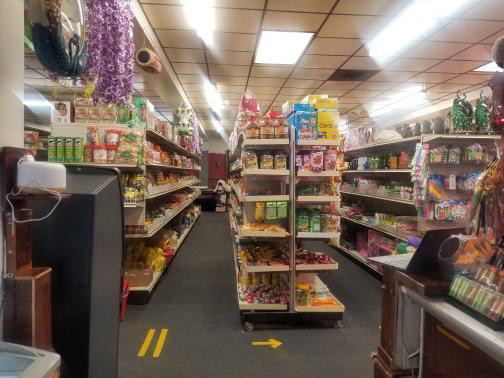
The aisles of goods at the Nim-Nim Nepali Bazaar, located at 4010 Saw Mill Run Blvd.
After working as a cashier for a few years, Krishna Subedi with Dil Phuyal opened up the food market Nim-Nim Nepali Bazar in 2018.
“I decided to become a store owner because I was interested in experiencing something new,” Subedi said.
Subedi didn’t think she could make it as a store owner, but she is glad she pursued the dream since it allowed her to support her family.
“I am happy that I get to provide for my family,” Subedi said.
For store manager Tulsi Subedi, running a market wasn’t something that he believed he would be doing one day.
“I never thought I would be a manager,” Subedi said.
Most of Nim-Nim’s produce comes from New York, but they also get items from India, Nepal, Bhutan, and China.
“We sell fresh produce at reasonable prices and provide good customer service,” Subedi said.
They are happy with the outcome of their store, though there have been tough moments. When Covid hit, they had a hard time finding workers and they had supply chain issues.
“We were lacking employees, had a hard time getting fresh produce, and had to stay home most of the time,” Subedi said.
Today, though, the owners of Nim-Nim, are back on their feet and are ready to grow and expand. Subedi wants to add items that will appeal to the younger generations of the Nepali community.
Baldwin junior Sumira Rai visits Nim-Nim frequently with her family and commends the influence it has on the community.
“I go to Nim-Nim with my parents and we get our fresh produce for our cultural recipes there. I feel like places like these are very important in preserving my culture,” Rai said.
Frequent customer Santi Subba wants the business to keep flourishing and providing her with the items she seeks.
“This place is very organized and offers a wide variety of items,” Subba said.
Passion for cooking leads to new business
After Ambika Acharya moved to America, she discovered her passion for cooking. Then she found Momo Corner restaurant, and in 2018 she purchased the store from its owner.
The restaurant is mainly focused on the traditional Nepali dumpling dish momo. They offer many varieties, including chili momo; jhol momo, which is momo in soup; and sadako momo, which is marinated momo with spices. The restaurant also offers other dishes such as chow mein; paneer tikka masala, a marinated paneer cheese dish served in gravy; and thukpa, a noodle dish served in soup.
The interior of the restaurant is small but neat, with a comfortable environment to enjoy a meal. Frequent customer Greg Johnson said he gravitates toward Momo Corner because he enjoys both the food and the atmosphere there. He also likes the more modern look of the restaurant.
Customers like Johnson are often introduced to Nepali culture through friends and coworkers.
“I have a lot of Nepali friends so I eat a lot of Nepali food. I even picked up some of the language,” he said.
Acharya, the owner, explained that she is happy to have so many non-Nepali customers.
“We feel very proud that the people here appreciate and like our food and culture,” she said.
Baldwin sophomore Kavya Odari also frequents the restaurant.
“The momo there is superior to all other momos, and the workers are all really nice,” she said.
Salon offers fusion of Nepali, Western cultures
Freestyle Beauty Salon owner Laxmi Dhakal felt inspired to open her own salon after working at a typical American salon.
She found that at the American salon that she was working at, she was experiencing a language barrier between her and her clients. But at the same time, she gathered a large number of returning Nepali clients.
She had gone into the cosmetology field with the intention of opening her own business eventually, but this realization only encouraged her more.
The interior of her salon looks different from a typical salon in America, as it incorporates many elements of Nepali culture. At the entrance, a variety of Nepali jewelry and beauty products are presented.
When she was younger, Dhakal did not want to study cosmetology, and she used to question why people would go into this field.
Now, however, she loves working in this field because it helps people who are feeling down a bit to be more confident. She said it even helps people who are going through breakups or those who want to improve their self-esteem.
“It helps people love themselves, which is why I love this work. I realized how much my small service can help and impact people,” she said.
While most of her customers are Nepali, she wants her clientele to be more diverse.
“I have always wanted to have a wider range of customer demographics and I am definitely making progress in this regard.”
Family members come together to open restaurant
Pema Gurung and three other family members bought Everest Kitchen restaurant in 2018 because of their desire to be self-employed in a family business. After seeing other Nepali people do the same in other states, they decided to try it themselves.
One of their main goals is to have the family be more involved with the restaurant. Bajendra Dulal, one of the owners and a waiter at Everest, said there are many benefits to owning a restaurant, with one of them being that it is a social service.
“I love being a waiter here because it allows me to socialize and talk with many different types of people,” Dulal said.
The owners are happy to see that the restaurant appeals to non-Nepali customers, as it is an opportunity to share their culture.
“We’re happy to share our cuisine, just like they’re happy to eat it,” he said.
Everest Kitchen offers a wide selection of Nepali foods, but the most popular dishes are momo, pork sekuwa, a grilled pork dish with vegetables; and thali, which has rice and different types of curries.
The interior of the restaurant is aesthetically pleasing with a comfortable environment. The restaurant also has Nepali artwork on the walls and a space depicting the village life in Nepal.
Baldwin junior Rosalind Walker, who often goes to Everest with family, said they often try foods from different cultures. Samosa chaat, a dish of mashed potatoes mixed with various toppings, is her favorite.
“I wanted to support my close friend’s family, who own the restaurant, and it’s a place my mom and I enjoy going to,” Walker said.

